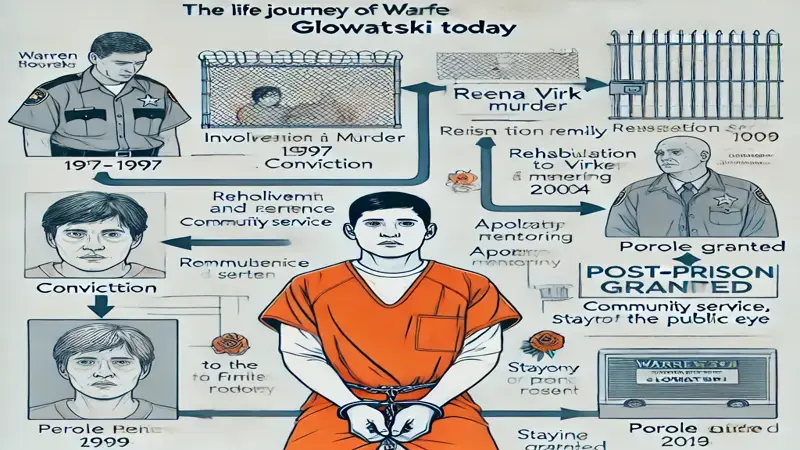Warren Glowatski Today story remains a crucial part of Canadian criminal history. His involvement in the 1997 murder of Reena Virk shocked the nation, sparking debates about youth crime and justice. Today, his life is a testament to the complex interplay of punishment, rehabilitation, and societal reintegration. Understanding Warren Glowatski today involves analyzing his actions after release and the broader implications of his case on justice reform.
The Reena Virk Case: A Dark Chapter
Warren Glowatski Today: In November 1997, the murder of Reena Virk, a 14-year-old girl, left Canada reeling. Warren Glowatski, along with Kelly Elliott, played a key role in this tragic crime. The assault and drowning near Victoria, British Columbia, revealed the horrifying realities of bullying, peer pressure, and unchecked violence among youth.
Glowatski, then 16 years old, received a conviction for second-degree murder. His actions, while not as direct as Ellard’s, contributed significantly to the crime’s outcome. This conviction marked the beginning of his journey through the Canadian justice system.
Glowatski’s Time in Prison
After his sentencing, Warren Glowatski Today served his time with a focus on rehabilitation. Unlike many cases where offenders resist change, Glowatski actively pursued personal growth. He participated in educational programs, attended counseling sessions, and engaged in restorative justice initiatives.
Reports from correctional facilities consistently highlighted Glowatski’s commitment to change. He expressed genuine remorse for his actions and acknowledged the pain he caused Reena Virk’s family. His early behavior in prison laid the foundation for discussions about his potential reintegration into society.
Parole and Reintegration
Warren Glowatski’s parole journey exemplifies the complexities of justice and forgiveness. In 2006, nine years into his sentence, Glowatski secured day parole. By that time, his record showed good behavior and progress toward rehabilitation. Parole board officials noted his low risk of reoffending, citing his participation in programs that addressed his violent tendencies.
By 2010, Glowatski earned full parole. This decision sparked mixed reactions. While some praised his transformation, others, including Reena Virk’s family, expressed concerns about whether justice had been fully served. Nevertheless, his release marked a significant milestone in his journey toward redemption.
Warren Glowatski Today
Today, Warren Glowatski leads a life focused on rebuilding and contributing to society. After his release, he prioritized living a low-profile life while making meaningful changes. Glowatski reportedly found steady employment and involved himself in community programs to mentor at-risk youth.
His efforts extend to advocating for restorative justice, emphasizing the importance of accountability and healing. By sharing his experiences, Glowatski aims to prevent others from repeating his mistakes. While his current location and specific activities remain private, his dedication to positive change defines Warren Glowatski today.
Public Reactions and Ethical Debates
Glowatski’s journey has sparked heated debates about justice and second chances. Critics argue that granting parole to individuals involved in heinous crimes undermines the gravity of their actions. They question whether Glowatski’s release adequately addresses the pain caused by Reena Virk’s murder.
Conversely, supporters highlight his rehabilitation as proof that individuals can change. They view Glowatski’s story as a successful example of Canada’s justice system focusing on reform rather than retribution. This divide underscores the challenges of balancing punishment with the potential for human growth.
Lessons from Warren Glowatski’s Case
The case of Warren Glowatski today teaches society valuable lessons about youth violence, rehabilitation, and justice. Addressing the root causes of such crimes—mental health, peer dynamics, and systemic failures—is crucial. His story also emphasizes the role of restorative justice programs in fostering accountability and empathy.
Glowatski’s transformation demonstrates that individuals can overcome their past mistakes with the right support systems. However, his case also serves as a reminder of the enduring pain left behind by violent crimes.
Conclusion
Warren Glowatski’s journey, from his involvement in Reena Virk’s tragic murder to his life today, remains a powerful narrative of redemption and controversy. His efforts to rebuild his life and contribute positively to society highlight the complexities of justice and forgiveness.
Understanding Warren Glowatski today requires acknowledging his past while recognizing his attempts to make amends. His story invites society to reflect on the balance between punishment and rehabilitation, reminding us of the growth potential even in the most challenging circumstances.
If you enjoyed this article and would like to read more like it, please check out the rest of our blog today.

I believe that avoiding processed foods may be the first step to be able to lose weight. They will often taste beneficial, but processed foods have very little nutritional value, making you take in more just to have enough vitality to get with the day. When you are constantly feeding on these foods, switching to cereals and other complex carbohydrates will let you have more electricity while eating less. Interesting blog post.